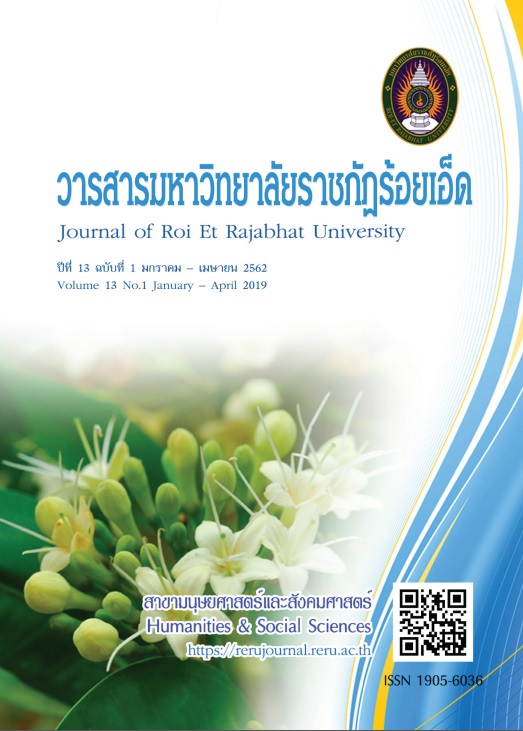The Development of Problem-solving Ability and Learning Achievement in Chemistry Subject of Mathayomsuksa 6 Students
Keywords:
Problem-solving ability, Problem-based Learning (PBL), Social network resourceAbstract
The aims of this classroom action research were 1) to develop students’ Problem Solving Ability in order to pass the criteria of 70% 2) to examine the learning achievement in chemistry subject. The sample group was selected by the purposive sampling with 19 students of Mattayomsuksa 6 who were considered as having limited in problem-solving ability. The purposive sampling was used to select the target group. The classroom action research consisted of 3 cycles. Furthermore, there were two participants in this study which were the chemistry co-teacher and the teacher in department of science. The instruments employed in this study were: 1) the problem-solving ability test 2) chemistry learning achievement test 3) problem solving observation form 4) Learning activity report 5) reflective 6) interview form 7) lesson plan. The results from classroom action research revealed that: 1) In phase 1, the students who learned by Problem-Based Learning had average score of Problem Solving Ability at 5.49 or 68.64%. There were 10 students from the sample group passed the criteria at a percentage of 70 which was 52.63%. Learning achievement score were 8.05 or 80.53%. 2) In phase 2, the students who learned by Problem-Based learning that cooperated with social media had average score of Problem Solving Ability at 5.49 or 68.64. There were 14 students from the sample group passed the criteria at a percentage of 70 which was 73.68%. Learning achievement score was 7.47 or 74.74%. 3) In phase 3, the students who learned by Problem-Based Learning cooperated with KWL technique had average score of Problem Solving Ability at 6.31 or 78.84%, There were 18 students passed the criteria at a percentage of 70 of total scores which was 94.74% The learning achievement score were 12.58 or 83.86%.
References
Berk, L. E., & Winsler A. (1995). Scaffolding children’s learning: Vygotsky and early childhood education. Washington: National Association for the Education of Young Children.
Laothiang, C. (2014). Ethics of Social media study (in Thai). Bangkok: Saisupan.
Eggen, P. & Kauchak, D. (2001). trategies and Models for Teachers: Teaching Content and ThinkingSkills (5th Edition). North Florida: University of North Florida.
Kammanee, T. (2008). Teachology: the components for effective learning management (in Thai) (7th ed). Bangkok: Chulalongkorn University Press.
Kammoon, S. & Kammoon, O. (2008). How to manage learning to develop thinking process [in Thai]. Bangkok: Phabpim Press.
Krongphonkhwa, P. (2016). Development of Physics Learning Activities by Using ProblemBased Learning cooperated Social Media to Promote Learning Achievement, Scientific Problem-Solving Ability and Putting Effort Persistently for 10 Grade Students (in Thai). Mahasarakham: Mahasarakham University.
Moonkham, S. & Moonkham, O. (2001). 19 Methods for Instruction of Knowledge and Skill Development. Bangkok: Thai Watana Panit.
Nungchalerm, P. (2013). Research in learning and teaching ([in Thai)]. Bangkok: Chulalongkorn University Press.
Paisri, S. (2014). Developing learning achievement, thinking for problem-solving, learning satisfaction for Mattayomsuksa 4 students by using 7E learning cycle model, 7E learning cycle modelcooperated with KWL technique (in Thai). Mahasarakham: Mahasarakham University.
Rangsi P. (2017). Developing problem-based ability by using problem-based learning for Mattayomsuksa 5 (in Thai). Mahasarakham: [in Thai]. Mahasarakham University.
Siriboonnam, R. (2018). Comparisons of analytical thinking abilities, science learning achievement on Acid-base, and attitudes toward chemistry learning of Matthayomsueksa 5 students learned by the 7-E learning cycle, KWL learning method, and the conventional approach (in Thai). Mahasarakham: Mahasarakham University.
Siripimon, H.. (2008). The Development of science-problem Solving Ability and avidity for learning Characteristic of tenth grade students taught by inquiry approach (in Thai). Bangkok: Silaphakorn University.
The Institute for the promotion of teaching science and technology. (2008). 5th years Strategic of The Institute for the promotion of teaching science and technology 2014 to 2018. Bangkok: IPST.
The Ministry of Education. (2017). The Basic Education Core Curriculum B.E 2551 (2008) (revised Edition B.E. 2560 (2017). Bangkok: IPST.
Torp, L., & Sage S. (1998). Problems as possibilities: Problem-based learning for K-12 education. as Possibilities: Science and Education. Virginia: Association for Supervision and Curriculum Development.
Downloads
Published
How to Cite
Issue
Section
License
บทความที่ได้รับการตีพิมพ์เป็นลิขสิทธิ์ของวารสารมหาวิทยาลัยราชภัฎร้อยเอ็ด
ข้อความที่ปรากฏในบทความแต่ละเรื่องในวารสารวิชาการเล่มนี้เป็นความคิดเห็นส่วนตัวของผู้เขียนแต่ละท่านไม่เกี่ยวข้องกับมหาวิทยาลัยราชภัฎร้อยเอ็ด และคณาจารย์ท่านอื่นๆในมหาวิทยาลัยฯ แต่อย่างใด ความรับผิดชอบองค์ประกอบทั้งหมดของบทความแต่ละเรื่องเป็นของผู้เขียนแต่ละท่าน หากมีความผิดพลาดใดๆ ผู้เขียนแต่ละท่านจะรับผิดชอบบทความของตนเองแต่ผู้เดียว





